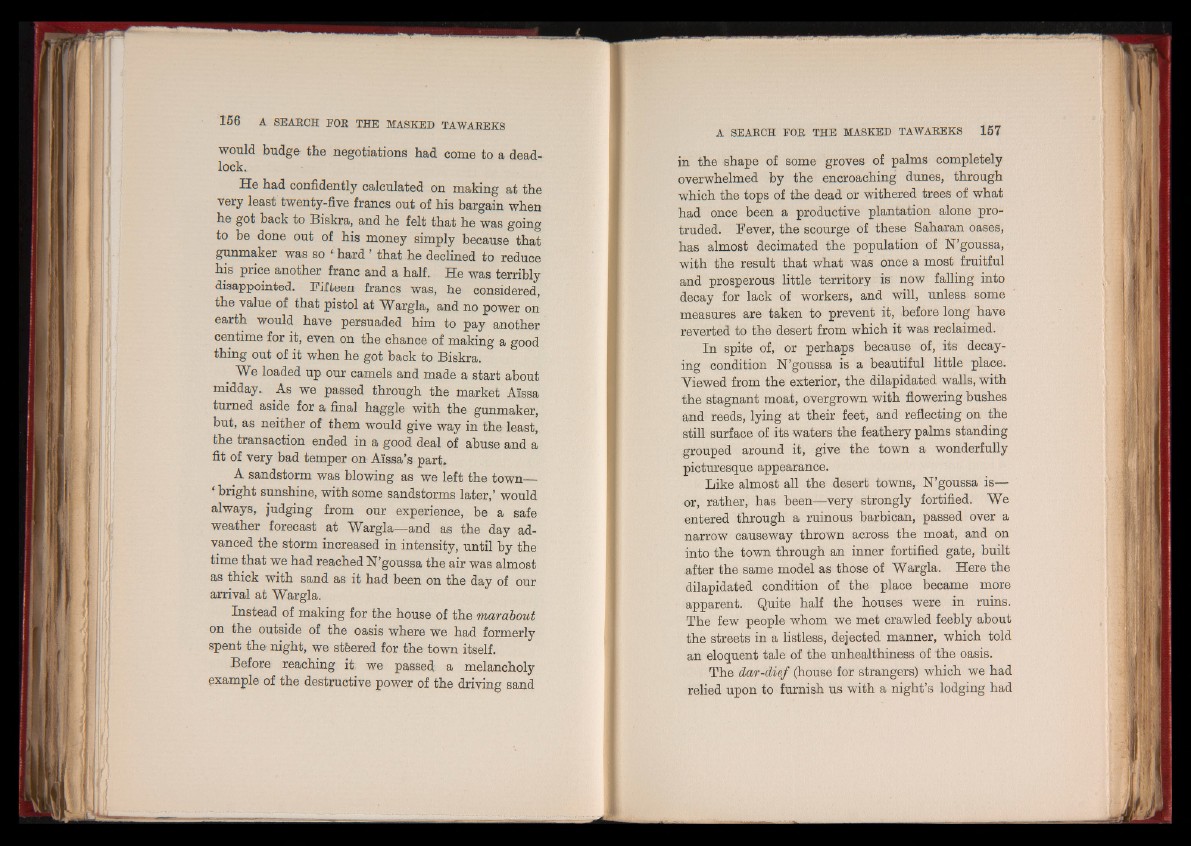
would budge the negotiations had come to a deadlock.
He had confidently calculated on making at the
very least twenty-five francs out of his bargain when
he got back to Biskra, and he felt that he was going
to be done out of his money simply because that
gunmaker was so * hard ’ that he declined to reduce
his price another franc and a half. He was terribly
disappointed. Fifteen francs was, he considered,
the value of that pistol at Wargla, and no power on
earth would have persuaded him to pay another
centime for it, even on the chance of making a good
thing out of it when he got back to Biskra.
_ "We loaded up our camels and made a start about
midday. As we passed through the market Aissa
turned aside for a final haggle with the gunmaker,
but, as neither of them would give way in the least,
the transaction ended in a good deal of abuse and a
fit of very bad temper on Alssa’s part.
A sandstorm was blowing as we left the town—
‘bright sunshine, with some sandstorms later,’ would
always, judging from our experience, be a safe
weather forecast at Wargla—and as the day advanced
the storm increased in intensity, until by the
time that we had reached N’goussa the air was almost
as thick with sand as it had been on the day of our
arrival at Wargla.
Instead of making for the house of the marabout
on the outside of the oasis where we had formerly
spent the night, we stbered for the town itself.
Before reaching it we passed a melancholy
example of the destructive power of the driving sand
in the shape of some groves of palms completely
overwhelmed by the encroaching dunes, through
which the tops of the dead or withered trees of what
had once been a productive plantation alone protruded.
Fever, the scourge of these Saharan oases,
has almost decimated the population of N’goussa,
with the result that what was once a most fruitful
and prosperous little territory is now falling into
decay for lack of workers, and will, unless some
measures are taken to prevent it, before long have
reverted to the desert from which it was reclaimed.
In spite of, or perhaps because of, its decaying
condition N’goussa is a beautiful little place.
Viewed from the exterior, the dilapidated walls, with
the stagnant moat, overgrown with flowering bushes
and reeds, lying at their feet, and reflecting on the
still surface of its waters the feathery palms standing
grouped around it, give the town a wonderfully
picturesque appearance.
Like almost all the desert towns, N’goussa is—
or, rather, has been—very strongly fortified. We
entered through a ruinous barbican, passed over a
narrow causeway thrown across the moat, and on
into the town through an inner fortified gate, built
after the same model as those of Wargla. Here the
dilapidated condition of the place became more
apparent. Quite half the houses were in ruins.
The few people whom we met crawled feebly about
the streets in a listless, dejected manner, which told
an eloquent tale of the unhealthiness of the oasis.
The dar-dief (house for strangers) which we had
relied upon to furnish us with a night’s lodging had